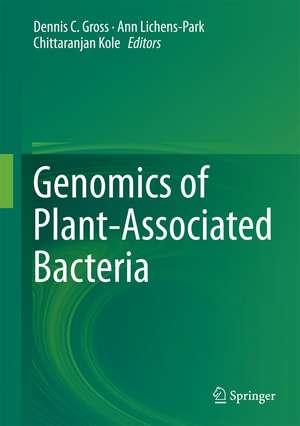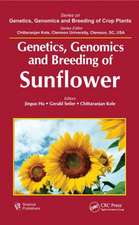Genomics of Plant-Associated Bacteria
Editat de Dennis C. Gross, Ann Lichens-Park, Chittaranjan Koleen Limba Engleză Hardback – 3 iul 2014
Topics considered in this volume include the importance of horizontal gene transfer in originating new bacterial strains and species and advances in transcriptomics that allow us to describe the complex regulatory networks critical to plant-microbe interactions. The availability of the Xanthomonas oryzae genome has led to new technologies in genome editing, which will revolutionize approaches to genetic engineering, even in eukaryotes. The contributions show how genomics has greatly accelerated progress toward understanding the biology of these bacteria and how that understanding can be translated into novel crop protection methods.
| Toate formatele și edițiile | Preț | Express |
|---|---|---|
| Paperback (1) | 643.65 lei 6-8 săpt. | |
| Springer Berlin, Heidelberg – 23 aug 2016 | 643.65 lei 6-8 săpt. | |
| Hardback (1) | 651.34 lei 6-8 săpt. | |
| Springer Berlin, Heidelberg – 3 iul 2014 | 651.34 lei 6-8 săpt. |
Preț: 651.34 lei
Preț vechi: 766.28 lei
-15% Nou
Puncte Express: 977
Preț estimativ în valută:
124.65€ • 129.66$ • 102.91£
124.65€ • 129.66$ • 102.91£
Carte tipărită la comandă
Livrare economică 14-28 aprilie
Preluare comenzi: 021 569.72.76
Specificații
ISBN-13: 9783642553776
ISBN-10: 364255377X
Pagini: 288
Ilustrații: X, 278 p. 36 illus., 13 illus. in color.
Dimensiuni: 178 x 254 x 21 mm
Greutate: 0.72 kg
Ediția:2014
Editura: Springer Berlin, Heidelberg
Colecția Springer
Locul publicării:Berlin, Heidelberg, Germany
ISBN-10: 364255377X
Pagini: 288
Ilustrații: X, 278 p. 36 illus., 13 illus. in color.
Dimensiuni: 178 x 254 x 21 mm
Greutate: 0.72 kg
Ediția:2014
Editura: Springer Berlin, Heidelberg
Colecția Springer
Locul publicării:Berlin, Heidelberg, Germany
Public țintă
ResearchCuprins
“Genomics of Erwinia amylovora and Related Erwinia Species Associated with Pome Fruit Trees” by Youfu Zhao.- “Genomics of Plant-Associated Bacteria: The Soft Rot Enterobacteriaceae” by Amy O. Charkowski, Jenna Lind and Isael Rubio-Salazar.- “Ecological Genomics of Pseudomonas syringae” by David A. Baltrus, Tory A. Hendry and Kevin L. Hockett.- “Pseudomonas syringae Genomics: From Comparing Individual Strains to Analyzing Entire Populations” by Boris A. Vinatzer, Caroline L. Monteil and David J. Studholme.- “Genetics and Functional Genomics of the Pseudomonas fluorescens Group” by Sarah Craven Seaton and Mark W. Silby.- “The Genomics of Xanthomonas oryzae” by Lindsay Triplett, Ralf Koebnik, Valerie Verdier and Jan E. Leach.- “Genomics of Xanthomonas citri and Related Species” by Neha Jalan, Qing Yan, Sunitha Kogenaru, Yinping Guo, Jeffrey B. Jones, James H. Graham and Nian Wang.- “Genomic Insights into Xylella fastidiosa Interactions with Plant and Insect Hosts” by Adam C. Retchless,Fabien Labroussaa, Lori Shapiro, Drake C. Stenger, Steven E. Lindow and Rodrigo P. P. Almeida.- “Comparative Genomics of the Liberibacteral Plant Pathogens” by Hong Lin and Edwin L. Civerolo.- “Phytoplasma Genomes: Evolution through Mutually Complementary Mechanisms, Gene Loss and Horizontal Acquisition” by Yan Zhao, Robert E. Davis, Wei Wei, Jonathan Shao and Rasa Jomantiene.
Recenzii
“The book Genomics of Plant-Associated Bacteria is composed of 10 chapters. Each chapter is dedicated to different plant-associated bacteria. … I found the breadth of bacterial species covered by the book to be quite refreshing. Each chapter covers the biology, taxonomic setup, and genomic insights of different plant-associated bacteria very well. … This book would be especially useful to graduate students and also scientists who have recently switched to the field of plant-microbe interactions.” (Maxwell R. Fishman, The Quarterly Review of Biology, Vol. 91 (1), March, 2016)
Textul de pe ultima copertă
This book describes how genomics has revolutionized our scientific understanding of agriculturally important plant-associated bacteria. Each chapter focuses on the genomics of particular bacteria: the first described plant pathogen, Erwinia amylovora; phytoplasmas lacking cell walls; fastidious, phloem-restricted liberibacters; Pseudomonas syringae, which is a genetically tractable model system; Xanthomonas citri, which causes a disease that can devastate citrus crops; and Pseudomonas fluorescens, which can protect plants from diseases.
Topics considered in this volume include the importance of horizontal gene transfer in originating new bacterial strains and species, and advances in transcriptomics that allow us to describe the complex regulatory networks critical to plant-microbe interactions. The availability of the Xanthomonas oryzae genome has led to new technologies in genome editing, which will revolutionize approaches to genetic engineering, even in eukaryotes. The contributions show how genomics has greatly accelerated progress toward understanding the biology of these bacteria and how that understanding can be translated into novel crop protection methods.
Topics considered in this volume include the importance of horizontal gene transfer in originating new bacterial strains and species, and advances in transcriptomics that allow us to describe the complex regulatory networks critical to plant-microbe interactions. The availability of the Xanthomonas oryzae genome has led to new technologies in genome editing, which will revolutionize approaches to genetic engineering, even in eukaryotes. The contributions show how genomics has greatly accelerated progress toward understanding the biology of these bacteria and how that understanding can be translated into novel crop protection methods.
Caracteristici
Offers an up-to-date insight into the latest results of the genetics and genomics of plant-associated bacteria Describes both theoretical and practical aspects of fighting against crop loss Of particular interest for scientists in industry, academia and government First book that describes the genomes of several distinct groups of plant-associated bacteria and shows the tremendous progress made over the last decade Includes supplementary material: sn.pub/extras















